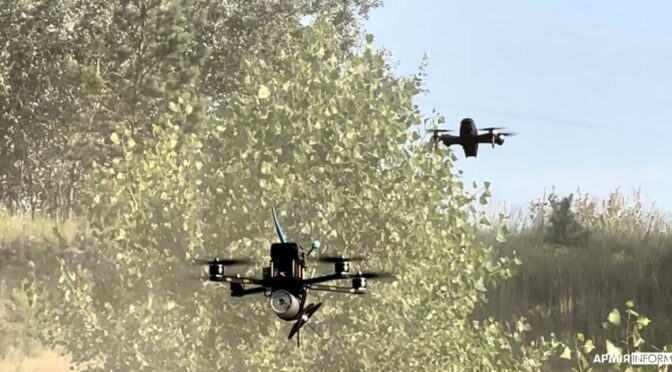Article published in The Daily Express, 5 June 2024. © Richard Kemp
On Tuesday bidding was opened by the British government to provide drones to Ukraine that might have a major influence on the course of the war.
The UK and Latvia are leading nine other states in a programme to supply large numbers of ‘first person view’ (FPV) drones to Ukraine, leveraging Western industrial capacity. These are small quadcopter drones controlled directly by an operator using the system’s camera to hit the target with explosives.
FPV drones have had a major impact on the battlefield in this conflict and have been used to target armoured vehicles, defensive bunkers, infantry soldiers and ships. The Ukrainian Army now has a dedicated drone force, and most frontline units have specialist operators assigned to carry out surveillance of enemy forces and strike them with explosives.
Ukrainian drones have played a significant role in slowing the current Russian offensive in the Kharkov area, which now appears to be bogged down. I observed them in action at Bakhmut last year and saw first hand their remarkable accuracy and killing power against Russian troops, as well as their ability to coordinate with other combat forces to help direct artillery and armour against the enemy.
Drones are of course used by the Russians as well, and are notoriously hard to defend against. We have seen the devastating effects of Hizballah drones in northern Israel only this week, against a country that probably has the best air defences in the world.
Stopping them before they go into action is therefore extremely important, including in manufacturing, transportation and storage facilities.
The Pentagon recently lifted restrictions against using US supplied weapons against Russian territory, but only in specific areas. Ukraine should now be given much wider freedom of action, including to destroy drones before they get anywhere near the battlefield.
Kyiv has been manufacturing and procuring drones on a large scale since the war began, often adapting commercially-produced versions for combat use.
Russian military commentators have recently complained that Ukraine has achieved a large numerical advantage in drone warfare as well as a superior ability to integrate them effectively with other forces. Moscow will therefore be spurred into trying to gain the level of superiority in this area that they have in other combat capabilities.
That underlines the importance of the competition launched by Britain to supply thousands more drones. It is essential that this is done on a wartime footing, if necessary discarding standard commercial practices to achieve the greatest possible speed and volume.
As the saying goes: ‘perfect is the enemy of the good’.
Image: Wikimedia Commons

